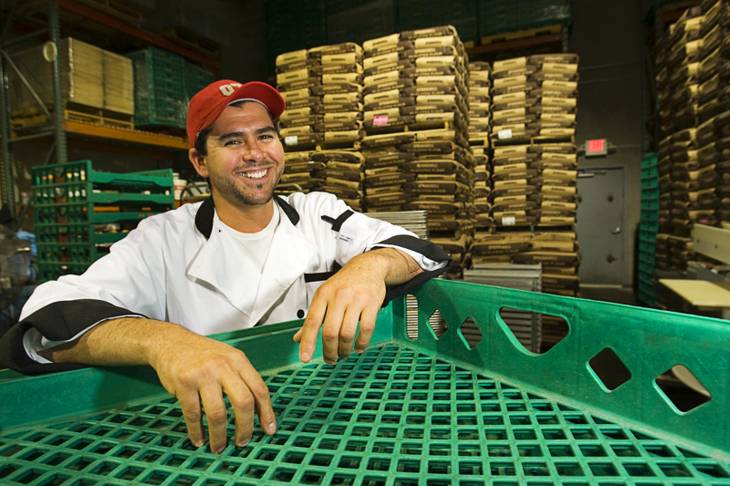Get more information
It isn’t easy for a small business to become a supplier to one of Southern Nevada’s major companies, but it is possible.
Just ask Miguel Jimenez.
Given the opportunity to take the reins of a small retail bakery, Jimenez decided in 2003 to branch out and supply bagels to the Studio Café at the MGM Grand.
Today, Jimenez’s small company, Bagel Bagel, provides bagels for every restaurant in MGM Resorts International’s Southern Nevada resort properties.
But it took lots of hard work and long hours.
Every day of the year, holidays included, Bagel Bagel’s 18 employees make and deliver 12,000 bagels to MGM properties.
“I haven’t done deliveries in three or four years, but when I did, I would be at work at around 10 in the morning to make the bagels,” Jimenez said. “I’d get done at somewhere between 7 and 10 at night. Then, we’d make the deliveries and get done at around 6 or 7 in the morning. I’d go home and sleep for four hours and start over again.”
Jimenez doesn’t even have a retail store anymore. He works exclusively in wholesale, moving bagels to MGM properties and several other resort restaurants. He estimates that his company supplies bagels to 90 percent of the Strip properties.
In another part of town, Bob Ratner’s Rio Grande Meat Co., which has four employees, has become one of the leading suppliers of oxtails in the West, thanks to a major contract he has with Boyd Gaming Co.
“If you would have told me that I would have been able to do so much with just one product, I would have laughed at you,” Ratner said.
While Ratner supplies meats to other customers, it’s his contract with three downtown hotels — the California, Fremont and Main Street Station — that makes his business successful.
He generally delivers 200 to 250 30-pound cases of oxtails a week to the downtown Boyd properties.
VEGAS INC archives
- A Hawaiian island in the Nevada desert (Feb. 221, 2012)
Oxtail is the staple ingredient for oxtail soup or oxtail stew, which are dishes favored mostly by Asian and Hawaiian cultures.
As the leading casino marketing company to Hawaiians, it stands to reason why Boyd orders so many oxtails from Rio Grande.
One of the common denominators for the small-business contracts to supply bagels and oxtails to Las Vegas resort properties is the contractors’ ability to identify a niche and fill it.
Jimenez started small — just one food outlet at one property. Eventually, he was able to grow because managers at the various restaurants and stores talk to each other and invited Bagel Bagel to bid on their contracts.
Ratner said a key to his business strategy was to find niche supply contracts that he could fulfill well. The challenge now is to maintain quality and keep his bids competitive with rival companies.
Sun archives
A relatively new small company to Southern Nevada is executing a similar niche strategy by supplying shrimp to local resorts. Ganix Bio-Technologies developed its “aquaculture” division in North Las Vegas and grows shrimp in tanks in 120-day cycles to supply the city, which is the highest shrimp consumer per capita in the world, according to the company.
So how does a small company get its foot in the door of a megaresort?
For most companies, it’s a matter of patience, perseverance and good timing.
Many resort properties view and treat small companies the same way they work with minority- and women-owned businesses. That’s good news for small businesses, though, because the resort companies devote many resources to diversity initiatives.
Kenyatta Lewis, the director of supplier diversity and global procurement at MGM Resorts International, said on average her company contracts with 400 diverse and small-business owners on an annual basis.
“That’s going to fluctuate, based on the number of contracts awarded in a given year,” she said.
MGM’s program focuses on the company working with MWDBEs — minority-owned, women-owned and disadvantaged business enterprises. The company recently broadened its supplier diversity program to include businesses owned by veterans, disabled and lesbian, gay, bisexual or transgender individuals.
Lewis said MGM’s buyers connect with small businesses through product expos, chamber of commerce networking events and small-business organizational events.
Caesars Entertainment’s code of commitment includes a goal to seek out certified minority-owned, women-owned, disabled and disadvantaged business enterprises to provide goods and services. Caesars says it mentors disadvantaged companies to make them successful.
Rick Darnold, vice president of strategic sourcing for Boyd Gaming, says his company works pretty much the same way.
“We’re talking about all ranges of ethnic groups,” Darnold said. “Whether a company is woman-owned or minority-owned, our objective is to give everybody a shot at doing business with us.”
Darnold said his company gets about 100 new registrations to conduct business a month.
Boyd has a website accessible from the company’s main site that leads prospective contractors to BeST — Boyd Gaming e-Sourcing Tool. In addition to the company’s purchasing policies and business requirements, the site, which has been operational for four years, includes an electronic application to do business with the company and account information for established companies.
Certification is a key aspect to the process and MGM uses a third party to evaluate companies seeking to do business.
Lewis says the Nevada Department of Transportation is one of the agencies that evaluates a company’s ability to deliver a product or service, although MGM also works with the Nevada Minority Business Council and the Women’s Business Council, based in Arizona.
Boyd Gaming views a number of attributes when reviewing suppliers. Darnold says the company wants suppliers to have a solid financial standing, a track record, references, timely price quotes and consistent on-time deliveries in addition to competitive quality and pricing.
“We ask for basic information,” Darnold said, “like the legal name of the company, its structure, whether it’s a partnership, a sole proprietorship, an LLC, and basic information like tax numbers. There’s no charge to do that.”
The hardest part: Getting that first contract.
“No major corporation wants to be a guinea pig,” Lewis said. “We can’t afford to have someone win a contract and then not be able to fulfill it.”
MGM has about 120 procurement representatives who help develop lists of goods and services the company needs. Some would be considered everyday items that one would expect a major resort company would need — bedding, sheets, towels and linens. Several different food varieties are common purchases. Gaming equipment is acquired through companies that have been licensed by state gaming regulators to conduct business.
But some buys are more specialized. Lewis noted that Mandalay Bay’s Shark Reef attraction has a special list of equipment and food needs for the fish and animals that bring in thousands of tourists.
The Boyd Gaming website has a list of goods and services it bids for regularly, and there are 220 items on it.
Lewis and Darnold both recommend that companies new to the game take baby steps when pursuing contracts with them.
Darnold suggested that it would usually be best for a company to focus on single-property contracts at first.
“You need to be laser-focused today in order to be better positioned to do more things tomorrow,” he said. “Get your foot in the door on a smaller scale.”
Once a company has shown it can perform on a small basis, it will be welcomed — even encouraged — to bid for more, just as Bagel Bagel found.
Once a company successfully connects in Southern Nevada, it may be invited to bid at out-of-state sister properties. MGM, for example, operates in Reno, Detroit and Mississippi. Boyd, meanwhile, operates in New Jersey, Indiana, Illinois, Louisiana and Mississippi.
The biggest problem small companies have when they begin conducting business with resorts is losing the focus Darnold cited and trying to do more than the small business can manage.
Lewis says small businesses occasionally underestimate some of the costs of doing business when they deliver their products.
“You have to understand, for example, how something like freight-shipping prices can affect your competitive bid,” she said.
Lewis also suggested that small companies shouldn’t be afraid to team up with a rival to go for a large contract. Bidding for larger purchases can drive costs down and lead to a more competitive bid.
Procurement officers will work with small companies and critique their bids so that a company will have a better chance the next time they try.
“We really want these companies to succeed because, in the long run, it helps our company,” Lewis said. “We’re interested in getting the best possible bid. so we’re going to do what we can to get that.”



